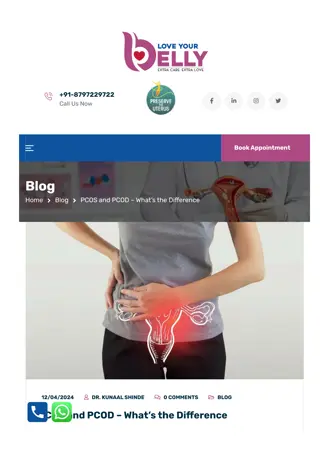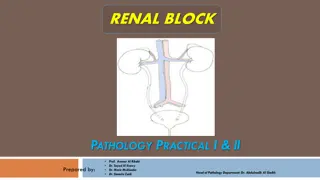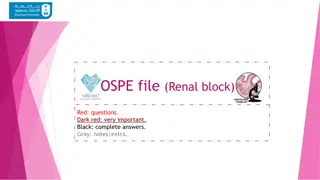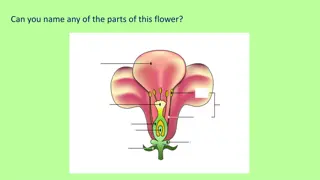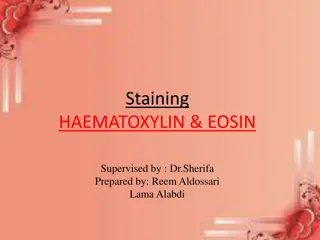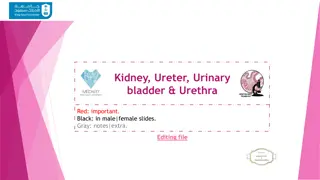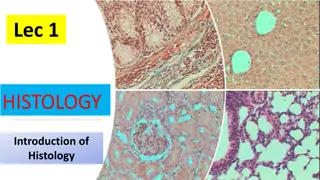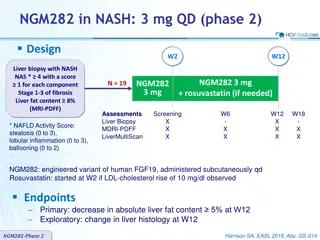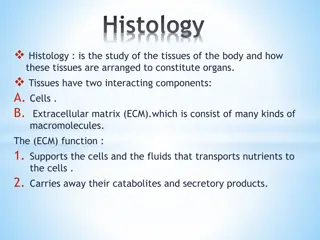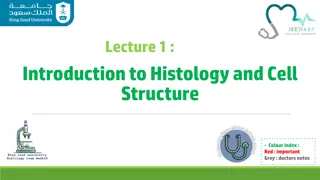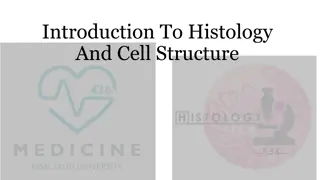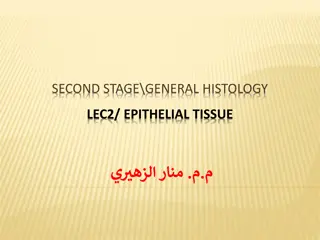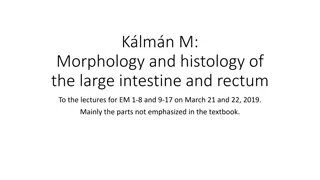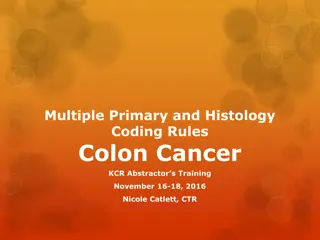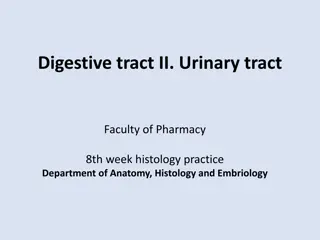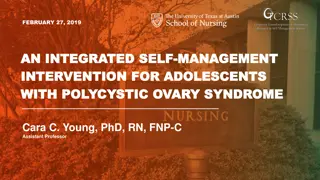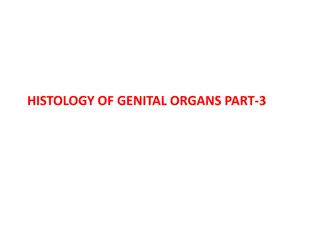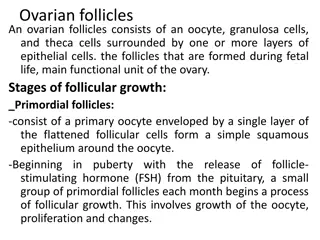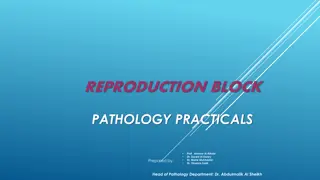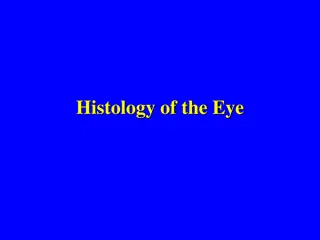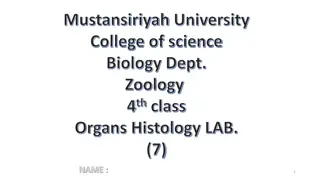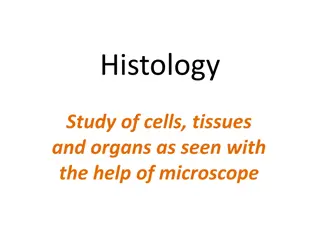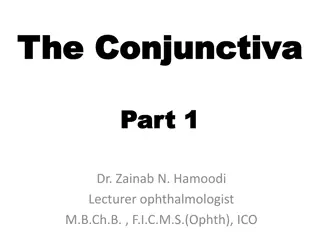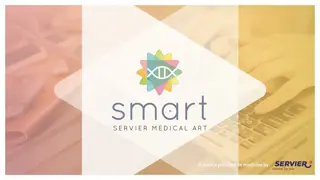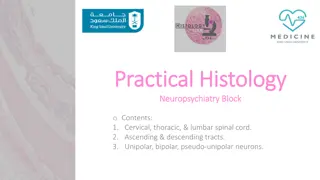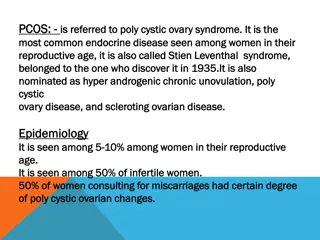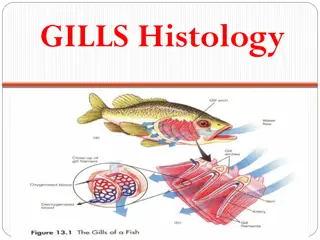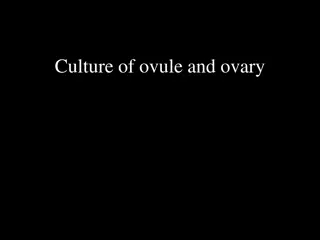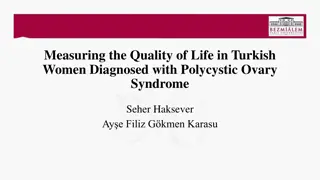PCOS and PCOD – What’s the Difference
(PCOS and PCOD) Polycystic Ovary Syndrome and Polycystic Ovary Disorder are commonly heard regarding women\u2019s health. These conditions are often used interchangeably, However, there is a difference between the two. PCOS is the more common of the two conditions and is caused by an imbalance of ho
8 views • 6 slides
Renal Block Pathology Practical: Anatomy and Histology Overview
The Renal Block Pathology Practical provides a comprehensive insight into the anatomy, structure, and histology of the kidney nephrons, including normal and abnormal conditions such as acute kidney injury. The session covers topics like the structure of the nephron, normal kidney gross anatomy, rena
4 views • 47 slides
Histology of the Renal System for OSPE Exam Preparation
This comprehensive OSPE file for renal block covers key structures of the kidney including the cortex, juxtaglomerular apparatus, renal corpuscle, and kidney medulla. It provides detailed identification of structures, labeling of components, and differentiation between tubules. Helpful images and de
0 views • 11 slides
The Fascinating Life Cycle of Flowering Plants
Discover the various parts of a flower such as petals, stigma, stamen, anther, filament, nectary, sepal, ovary, and ovule. Learn about the role each part plays in plant reproduction by exploring activities on flower anatomy, seed dispersal, pollination, germination, and growth. Engage with interacti
0 views • 7 slides
H&E Staining in Histology
H&E staining, a widely used histological technique, involves staining cell nuclei blue and cytoplasmic components pink to aid in tissue structure analysis. This method provides essential insights into normal and pathological tissue changes, assisting in diagnoses and further testing decisions. The p
0 views • 7 slides
Microscopic Structure and Histology of Kidney and Urinary Tract
Explore the intricate details of kidney anatomy, nephron structure, glomerular filtration barrier, and the histology of renal cortex and medulla, renal corpuscle, proximal and distal tubules, juxtaglomerular apparatus, as well as the urinary bladder and urethra in both male and female. Delve into th
0 views • 17 slides
Introduction to Histology and Microscopy in Anatomy
Histology is the study of tissue structure and function in animals and plants, focusing on the microscopic structure of cells, tissues, and organs. It helps in understanding the relationship between structure and function, intertwining disciplines like cell biology, pathology, physiology, and bioche
1 views • 5 slides
NGM282 in NASH: Phase 2 Study on Liver Fat Reduction and Histology Changes
A phase 2 study on NGM282 in NASH patients showed a significant decrease in liver fat content, meeting the primary endpoint. Exploratory findings also indicated potential improvements in liver histology. The treatment involved NGM282 at 3 mg QD, with additional rosuvastatin if needed. Promising resu
0 views • 11 slides
Overview of Histology: Study of Tissues and Organs
Histology involves studying the tissues of the body and how they form organs. Tissues consist of cells and extracellular matrix, with functions like support, nutrient transport, and waste removal. The human body comprises epithelial, connective, muscular, and nervous tissues, each with specific func
0 views • 4 slides
Introduction to Histology and Cell Structure
Histology is the microscopic study of normal tissues utilizing light and electron microscopes. This field explores the composition and function of cells, focusing on the nucleus, cytoplasm, organelles, and inclusions. Thin tissue sections stained with Haematoxylin and Eosin reveal distinct cellular
0 views • 23 slides
Histology and Cell Structure Fundamentals
Delve into the intriguing world of histology and cell structure, exploring the composition of cells, the functions of various components like the nucleus and cytoplasm, and the significance of organelles. Discover how histology is studied, the types of microscopes used, and the vital role of the cel
0 views • 24 slides
Challenges Faced in Histology Workforce Recruitment and Retention
Shelly Semerad, MA, CT (ASCP), faced challenges in recruiting and retaining histology personnel, leading to overnight positions remaining unfilled for months. Despite standard recruitment efforts and revised offerings, the shortage persisted. The team learned the importance of competitive compensati
0 views • 7 slides
Epithelial Tissue in General Histology
Epithelial tissue is a crucial type of tissue in the human body, performing functions like protection, absorption, secretion, and sensation detection. This tissue is composed of cells with minimal extracellular matrix and plays a vital role in various bodily processes. Learn about the classification
0 views • 47 slides
Anatomy Review: Large Intestine and Rectum Histology
The presentation delves into the detailed morphology and histology of the large intestine and rectum, covering aspects often not emphasized in textbooks. It explores nuances such as the S-shaped structure of the rectum, the composition of the anal canal, the layers of epithelium, and the territorial
1 views • 8 slides
Guidelines for Multiple Primary & Histology Coding in Colon Cancer Abstractor Training
Utilize the Multiple Primary & Histology Coding Rules for accurate case abstraction. Understand equivalent terms, definitions, and instructions to determine multiple primaries for solid malignant tumors diagnosed after January 1, 2007. Avoid relying on physician statements and prioritize following t
0 views • 64 slides
Histology Overview of Digestive and Urinary Tracts in Pharmacy Practice
This histology practice session delves into the intricate details of the digestive and urinary tracts studied in the 8th week of Pharmacy school. Explore images showcasing the structures of the colon, vermiform appendix, liver, pancreas, and nephron. Gain insights into the histological features of t
0 views • 19 slides
Leading Pathology and Histology Laboratory in Israel
L.E.M Laboratory in Israel, founded in 2001, is a premier facility offering high-quality medical services including Pathology and Histology tests. The lab stands out for its commitment to technology in the field, advanced information systems for efficient management, and stringent quality control me
0 views • 14 slides
Utilizing the DUTCH Test for PCOS
Polycystic Ovary Syndrome (PCOS) is a common endocrine disorder in females with various genetic, environmental, and lifestyle influences. The Rotterdam Criteria, involving oligo/amenorrhea, hyperandrogenism, and polycystic ovaries, is used for PCOS diagnosis. The DUTCH Complete test can assess insul
0 views • 92 slides
Integrated Self-Management Intervention for Adolescents with Polycystic Ovary Syndrome
Research led by Cara C. Young focuses on developing a mindfulness-based healthy lifestyle intervention for adolescents with polycystic ovary syndrome (PCOS) and their parents. The study aims to improve self-management capabilities among adolescents with PCOS, a condition that impacts both physical a
0 views • 9 slides
Female Ovary Histology and Function Overview
The female reproductive organ, the ovary, plays crucial roles in oocyte development, hormone production, and ovulation. Structurally, ovaries have a cortex and medulla, with follicles containing oocytes and surrounding cells. The primary follicle marks the onset of follicular maturation, leading to
0 views • 12 slides
Ovarian Follicles: Growth Stages and Cellular Composition
Ovarian follicles are the main functional units of the ovary, comprising an oocyte, granulosa cells, and theca cells surrounded by epithelial layers. The growth stages include primordial, primary, and secondary follicles, each characterized by specific cellular changes and development processes driv
0 views • 8 slides
Optimizing CHO Bioprocesses with Amino Acid Prediction Tool
University of Massachusetts Lowell has developed a genome-scale model for Chinese Hamster Ovary (CHO) cells, enhancing bioprocess optimization. The Amino Acid Level Prediction Tool complements this, aiding in predicting key nutrient levels for improved process control. Supported by advanced algorith
0 views • 21 slides
Male Reproductive System: Testis and Prostate Anatomy and Histology
Explore the normal anatomy and histology of the testis and prostate in the male reproductive system. Detailed images and descriptions provide insights into the structures and functions of these important organs. Understand the gross and microscopic features of the testis, including seminiferous tubu
0 views • 39 slides
Histology of the Eye: Structure and Function Overview
Explore the histology of the eye, covering the general structure and the microscopic details of the cornea and retina. Learn about the three coats of the eye bulb, including the fibrous, vascular, and neural tunics. Dive into the composition of the cornea, from its transparent and highly innervated
0 views • 24 slides
Anatomy and Histology of the Eye: A Comprehensive Study
An in-depth exploration of the anatomy and histology of the eye, covering structures such as the cornea, sclera, choroid, iris, and more. Detailed descriptions of each component, including layers, composition, and functions, are provided alongside accompanying images for visual reference.
0 views • 11 slides
Introduction to Histology: Study of Cells, Tissues, and Organs
Histology, also known as microscopic anatomy, focuses on the study of cells, tissues, and organs through a microscope. It encompasses the examination of epithelial tissues, their special characteristics, functions, and embryological origins. Epithelial tissues play crucial roles in protection, absor
0 views • 55 slides
The Anatomy and Histology of the Conjunctiva
This educational content explores the intricate details of the conjunctiva, a thin mucous membrane that lines the inner surface of the eyelids and globe. Topics include anatomical divisions, histological features such as epithelium and stroma, and common microbial conjunctival pathologies like bacte
0 views • 51 slides
The Reproductive System
Explore the intricate details of the female and male genital apparatus, including the uterus, ovary, and testicles. Learn about the processes of ovulation, menstruation, and spermatogenesis. Uncover the complexities of the uterine and ovarian cycles, as well as the formation of spermatozoa.
0 views • 10 slides
Cancer Types Spending in Europe
Learn about the spending on various types of cancer in Europe including breast cancer, colorectal cancer, prostate cancer, lung cancer, ovary cancer, and pancreatic cancer. The information is based on the Comparator Report on Cancer in Europe 2019, which covers disease burden, costs, and access to m
2 views • 7 slides
Practical Histology: Spinal Cord Tracts and Neurons Overview
This practical histology guide covers the cervical, thoracic, and lumbar spinal cord segments, along with ascending and descending tracts, and pseudo-unipolar/unipolar neurons. It emphasizes key features such as the ventral and dorsal horns, gracile and cuneate tracts, and provides essential informa
1 views • 12 slides
Basic Histology and Tissue Types
Explore histology, tissues, and types of tissues including epithelial, connective, muscle, and nerve tissues. Learn about tissue characteristics, differences, and functions, as well as details on specific tissue types like cardiac muscle, bone tissue, skeletal muscle, and smooth muscle. Delve into e
0 views • 74 slides
Polycystic Ovary Syndrome (PCOS): A Comprehensive Overview
PCOS, the most common endocrine disease in women of reproductive age, is characterized by various symptoms including abnormal metabolism of androgens and estrogen, insulin resistance, and hyperinsulinemia. This syndrome is associated with multiple theories explaining its occurrence, and its proposed
0 views • 10 slides
Teleost Gill Histology and Function
This presentation delves into the intricate histology of teleost gills, showcasing the structure of primary and secondary lamellae, epithelial cells, mucous cells, and more. It illustrates the branchial anatomy in bony fish, detailing the arrangement of holobranchs and hemibranchs. Additionally, it
0 views • 11 slides
In Vitro Culture of Ovule and Ovary for Haploid Plant Production
In vitro culture of unpollinated ovaries and ovules offers an alternative method for haploid plant production. This process involves isolating and culturing ovules in a chemically defined nutrient medium to understand zygote development and embryo maturation stages. Techniques for collecting, prepar
0 views • 34 slides
Alternatives to Traditional Spay-Neuter Practices in Dogs
The article discusses the growing trend of alternatives to ovariohysterectomy (OHE) for spaying in dogs, questioning the long-held beliefs and examining the potential consequences. It explores the concept of ovary-sparing spay and its potential impact on longevity and health outcomes in dogs. Additi
1 views • 35 slides
Polycystic Ovary Syndrome in Adolescent Girls
Polycystic Ovary Syndrome (PCOS) is a common reproductive endocrine disorder affecting 5-10% of women. This article discusses the epidemiology, diagnostic criteria, clinical spectrum, and management strategies for PCOS in adolescent girls through two insightful cases. The cases highlight the varied
0 views • 59 slides
Polycystic Ovary Syndrome
Polycystic ovary syndrome (PCOS) is a common endocrine disorder among women, affecting reproductive age individuals. PCOS is believed to have a genetic component but is not fully understood. Symptoms include anovulation, excess androgenic hormones, insulin resistance, menstrual disorders, infertilit
0 views • 18 slides
Polycystic Ovary Disease
Polycystic ovary disease, also known as PCOS, is a common endocrine disorder in women characterized by elevated androgens. This syndrome can lead to various health hazards such as poor fertility and metabolic issues. The pathogenesis of PCOS involves abnormalities in androgen and estrogen metabolism
0 views • 22 slides
Quality of Life in Turkish Women with Polycystic Ovary Syndrome
Polycystic Ovary Syndrome (PCOS) is a common endocrine disorder in women affecting their quality of life. This study explores the impact of PCOS on Turkish women's well-being using the PCOSQ-50 questionnaire at Bezmialem Vakif University Medical Faculty Hospital.
0 views • 15 slides
Summary of Non-Alcoholic Fatty Liver Disease (NAFLD) Knowledge
Non-Alcoholic Fatty Liver Disease (NAFLD) is a common condition characterized by liver fat accumulation in individuals without alcohol abuse. Risk factors, disease progression, histology, screening, and non-invasive scoring methods are discussed. Visual aids illustrate the natural history, disease p
0 views • 17 slides
